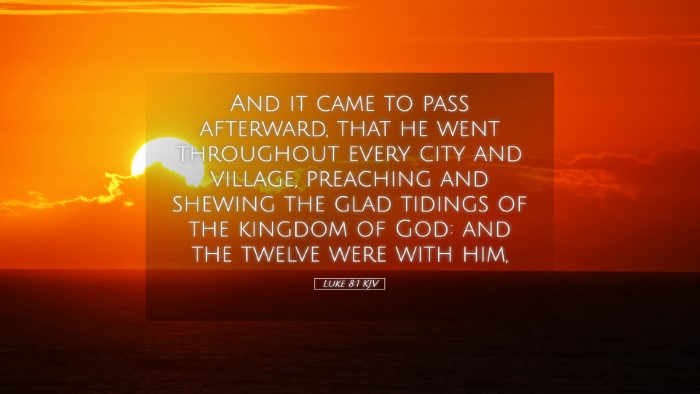Commentary on Luke 8:1
Verse Text: "And it came to pass afterward, that he went throughout every city and village, preaching and shewing the glad tidings of the kingdom of God: and the twelve were with him."
Introduction
This verse serves as a pivotal transition in Luke's narrative, marking the commencement of Jesus' teaching ministry in various cities and villages. The meticulous attention paid by Luke to the geographical spread of Jesus' ministry underlines the universal significance and appeal of the Gospel. Throughout this commentary, insights from Matthew Henry, Albert Barnes, and Adam Clarke will be synthesized, offering a deeper understanding of the theological implications and practical applications of this passage.
Contextual Analysis
The context of this verse cannot be overstated. Luke's Gospel is often referred to as the Gospel of compassion, and in this short verse, he encapsulates the essence of Jesus' mission. Observing the larger narrative, we find that Jesus is not only a teacher but also a preacher of good news—a role which signifies hope, redemption, and healing.
Geographical Scope of Ministry
Henry emphasizes the importance of Jesus traveling to different cities and villages, illustrating His dedication to reach the vast multitude. This reflects the inclusivity of the kingdom of God, where Jesus did not restrict Himself to urban centers but also ministered to rural areas. Barnes draws attention to the varied social contexts present in these locations, underlining how Jesus' message was relevant across diverse populations.
The Nature of the Message
Jesus is described as preaching and showing the glad tidings of the kingdom of God. This illustrates that His communication was both verbal and demonstrative, combining proclamation with tangible evidence of the kingdom through miracles and acts of kindness.
The Glad Tidings
According to Clarke, the phrase "glad tidings" denotes a joyful announcement, akin to news that brings hope and restoration. This word choice indicates that Jesus' message is not one of condemnation but of reconciliation. It challenges believers to consider how they present the Gospel today—are we bearers of glad tidings?
The Kingdom of God
The term "kingdom of God" is central in Jesus' preaching. Henry elaborates on the multifaceted nature of this kingdom, emphasizing it as both a present reality and a future hope. Barnes notes that it encompasses God's rule over the hearts of believers, as well as the future establishment of God’s reign in fullness. This duality speaks to believers today about living in the tension between the 'already' and the 'not yet.'
His Discipleship and Ministry Model
The verse mentions that "the twelve were with him," highlighting the essential role of discipleship. Clarke points out that Jesus gathered these individuals not only as followers but as co-laborers in His mission, illustrating a model of active participation in ministry.
Role of the Disciples
Henry suggests that the presence of the twelve during His ministry acted as a form of training. They witnessed the proclamation and the corresponding signs that accompanied it. Barnes adds that as they traveled with Him, they gained firsthand experience of His teachings and miracles, which equipped them for their future ministries. This serves as a reminder to modern-day believers of the importance of learning through active engagement in ministry.
The Implications for Today
This verse's emphasis on journeying and proclaiming the good news has powerful implications for pastors, theologians, and laypeople alike. It calls each believer to consider their role in proclaiming the kingdom of God and participating in God’s mission with fervor and joy.
Practical Application
- Proclaiming the Gospel: Each believer is called to share the glad tidings, reflecting on how they can articulate the hope found in Christ in their own communities.
- Active Participation: Engaging in ministry is not solely for clergy; all believers are called to be active participants in spreading the message of the kingdom.
- Inclusivity of the Gospel: Just as Jesus ministered to varied communities, believers today must strive to reach diverse populations with the transformative message of the kingdom.
- Community of Disciples: The importance of community in discipleship is vital; believers should seek to learn from one another in the context of shared ministry experiences.
Conclusion
In summarizing Luke 8:1, we discern a comprehensive view of Jesus’ mission and its exemplary model for the church today. The walking and preaching of Jesus demonstrate the necessity of an active faith that embodies and shares the message of the kingdom. The insights gleaned from the commentaries highlight the vital connection between proclamation and participation—challenging us to pursue both with intention and joy.


